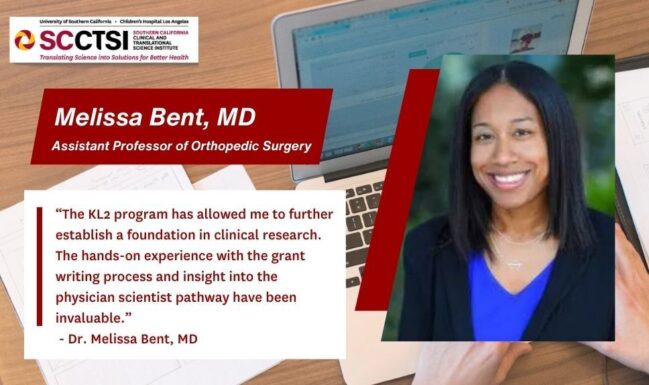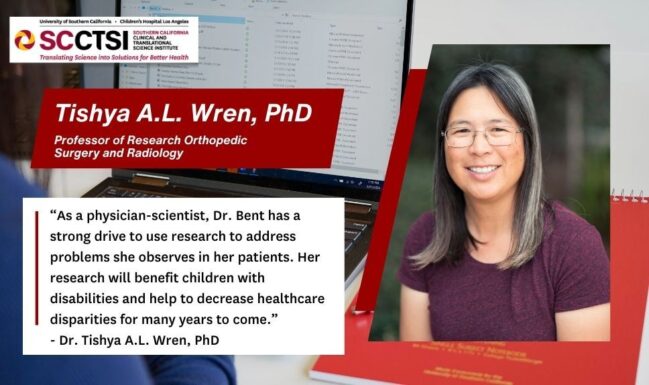Interview with Melissa Bent, MD, KL2 award recipient
An interview with a recipient of the SC CTSI Mentored Career Development in Clinical and Translational Science award
We sat down with Dr. Melissa Bent, a recipient of the SC CTSI Mentored Career Development in Clinical and Translational Science award, to hear about her experience as a KL2 scholar and how she has furthered her professional goals. We look forward to seeing all she will accomplish in the coming years.
Tell us a little bit about your experience so far in the KL2 program.
The KL2 program has been a great avenue to learn about research support at USC that I was not previously aware of, and allowed for the leverage of those resources. It has also provided me with a step by step framework on how to approach research—especially the structured clinical translational research (CTR) course.

How did you first learn about the program?
Through research success teams (RST) at CHLA and speaking to alumni such as Dr. Lorraine Kelley-Quon and Dr. Chris Russell.
What initially got you interested in starting this program?
I had been doing research “on the side” for many years since I started, and felt I needed to be more intentional about learning about tools and resources needed for successful research program development and grant success.
Tell us about your own background as a researcher and pediatric orthopedic.
My long-term goal is to become an independent investigator improving mobility for children with neuromuscular disorders and orthopedic conditions. The KL2 program has allowed me to further establish a foundation in clinical research by deepening my knowledge of mixed methods for qualitative and quantitative studies, biostatistical methods, cerebral palsy, and mixed reality pediatric rehab development. The hands-on experience with the grant writing process and insight into the physician scientist pathway have been invaluable.
During my time as junior faculty at CHLA, I have primarily focused on establishing my clinical practice. However, my passion for research has been reignited by my involvement in several studies that combine my clinical and educator roles. The most significant has been my weight management pilot study in patients with spina bifida; I was awarded the Academic Pediatric Association RAPID grant in 2020, which allowed me to creatively assess the feasibility of a virtual weight management program through the use of a mobile app to promote physical activity in overweight and obese adolescents with spina bifida. The KL2 was a great career development opportunity to gain skills to make myself competitive for funding opportunities.
What drove you to specialize in this?
I enjoy problem solving—fixing things literally and figuratively.
What do you think that others can gain from this program?
Dedicated time, structure and resources.
What has been the most rewarding part of being a part of the KL2 program?
Peer mentorship and learning how others have overcome similar challenges.
What does the KL2 program mean to you and how has it furthered your career?
It has been helpful in allowing me to dedicate time and resources to network, reach out to others in my space of research.

Who else has been an integral part of your success in this program?
Some people include: Tishya Wren, PhD who is my primary mentor, as well as my mentorship team comprised of Juan Espinoza Salomon, MD, Jeffrey Gold, PhD, and Beth Smith, DPT, PhD. Also, my leadership with the support of my division chief of orthopedics, Dr. Robert Kay, who has continued to elevate my visibility.
Dr. Tishya Wren is Dr. Bent’s mentor. We asked Dr. Wren, what has been your experience as a mentor to Dr. Bent?
I am privileged to mentor Dr. Bent in the KL2 program. This program has given Dr. Bent the opportunity to develop strong research skills to complement her clinical expertise. As a physician-scientist, Dr. Bent has a strong drive to use research to address problems she observes in her patients such as obesity due to mobility issues in children with neuromuscular disorders. She is learning to incorporate technology such augmented reality and mobile sensing to make evidence-based interventions available to all patients, especially those with greater social disadvantage. As she continues to develop as a clinician-investigator, her research will benefit children with disabilities and help to decrease healthcare disparities for many years to come.



